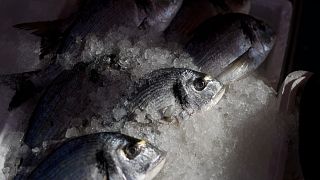Switzerland
On Monday (Mar. 13), the United Nation stressed ‘full commitment’ to the Black Sea Grain Initiative as Russia offered a 60-day extension.
The proposed extension is half the number of days agreed in November. The discussions on the initiative which allows exports of Ukrainian grain through the Black Sea come before it expires this weekend.
If a new step was reached in Geneva, concerns about global food safety remain.
"The global prices, these are sort of stabilised but other factors are important for food accessibility still remain challenging," Michael Puma, Director of Columbia University's Centre for Climate Systems Research said.
"Another concern even in the global markets is the continued presence of export restrictions, the number of restrictions has been at a high level, comparable to the food crises of 2007/2008, so there is concern that there is this tension in the markets that continues up until present, in the global markets."
Russia and Ukraine are key cereal crops and oils exporters.
The Black Sea Grain Initiative is a UN-backed deal also endorsed by Turkey. It includes a Memorandum of Understanding between Russia and the UN to ease fertiliser exports.
The UN said that since last August, it has allowed the exports of 24 million metric tonnes of grain, with 55% of food exports going to developing countries.




![Infrastructure: From foreign loans to domestic capital [Business Africa]](https://images.euronews.com/articles/stories/09/51/93/11/320x180_cmsv2_f217f1d0-4e9a-580e-ace8-0e71c9796f8d-9519311.jpg)








01:12
Moroccan king welcomes UN support for its Western Sahara autonomy plan
01:20
United Nations rights office alarmed by killings in Tanzania protests
02:18
UN calls for immediate ceasefire in Sudan's al-Fashir after mass killings
01:19
UN calls for support for Caribbean countries hit by Hurricane Melissa
01:31
UN urges safe passage for civilians in war-torn Sudan city of El- Fasher
01:51
Nelson Mandela lecture 2025: Francesca Albanese on the occupation of Gaza